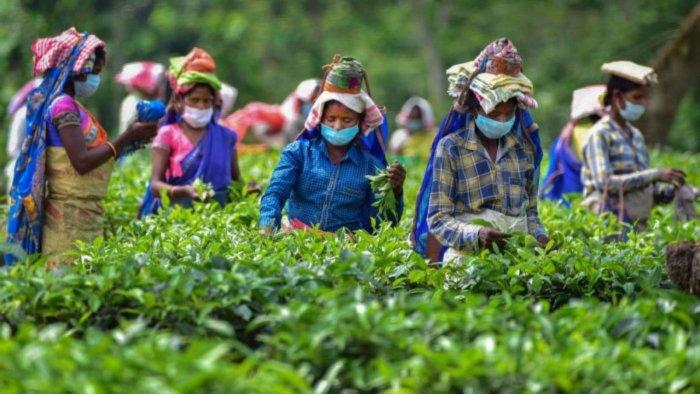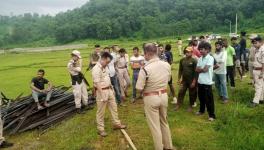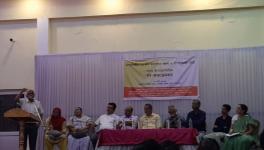Assam: Same Promise Each Election, but Tea Workers still Await Minimum Wage

Representational Image. Image Courtesy: PTI
On February 20 the Assam Government announced a hike of Rs 50 in the daily wage of tea garden workers. Through a gazette notification, the minimum wage for daily rated tea plantation workers was raised from Rs 167 – by an interim amount of Rs 50 – to Rs 217 per day. Further, a one-man committee under Principal Secretary J.B. Ekka was formed for the determination of wages for workers of small tea plantations,
However, on March 10, the Gauhati High Court stayed the state government's decision to increase daily wages to Rs 217. Over 7.46 lakh tea garden workers in the state are unlikely to benefit from an increase in daily wages in the immediate future. It came about due to the fallout of the Indian Tea Association’s (ITA) petition challenging the Assam Labour Department’s notification on the wage hike. Seven tea companies, who are members of the ITA, had initiated legal action.
On March 8, the petitioners’ counsel argued that the notification was “illegal” as no Committee/Sub-Committees had been formed as required under Section 5(1/a) and Section 9 of the Minimum Wages Act, 1948. Hearing the petition, Justice Michael Zothankhuma said the state authorities “shall not take any coercive action” till March 15 when the case is heard next.
Hearing the petition by the ITA, Justice Zothankhuma upheld the argument that the wage hike was “illegal”. The court instructed the government not to take any action against the ITA and the tea companies until a case challenging the state Labour Department's notification on the wage hike, is disposed of.
This essentially implies that the 17 tea companies, which own 90% of some 800 tea estates in Assam, cannot be penalised if they do not pay the enhanced wages to the tea workers in the state.
Notably, increasing the minimum wage of tea garden workers has been a major demand of the trade unions operating in Assam. Wages for the plantation workers are determined through collective bargaining, where the state government plays an important role. However, the wage so determined was abysmally low with the prevailing wage rate at Rs 167. In Assam, even the unskilled minimum wage in agriculture is Rs 332. The corresponding minimum wage for tea workers in Tamil Nadu and Kerala are Rs 314 and Rs 380 respectively.
As a result, tea workers in Assam, who are reasonably skilled, get a wage which is half of unskilled agricultural minimum wage. The difference in wages with the southern states implies that similar employment entails a wide variation in wages in two parts of the country.
Moreover, Assam produces over half of the total Indian tea production and around eight lakh workers are engaged in the tea industry. The price of Assam tea has shown an increasing trend over the years with the usual business cycle fluctuations. Area under tea and its production have also increased over the last two decades. Average auction prices for north Indian tea from January to December last year stood at Rs 201.87 per kg compared to Rs 152.26 per kg in 2019. During April-January it was up at Rs 221.33 per kg against Rs 153.50 a kg a year ago. However, wages remained pegged at a low level. Trade unions demanded a minimum wage on several occasions but that has not happened yet.
In 2017, the Assam government formed an advisory board to fix the minimum wage of tea workers. Subsequently, the board recommended an amount of Rs 351 per day as proposed minimum wage.
In 2018, the Assam government hiked daily wages from Rs 137 to Rs 167 as an interim increase. In 2019, a one-man committee, headed by the former chief secretary of Assam Kumar Sanjay Krishna, prescribed that the cash component of the wages be hiked to around Rs 195 and non-cash components could go up to around Rs 226.
An Election Issue
The daily wages of tea garden workers is an election issue in Assam with opposition parties, including the Congress, criticising the BJP-led government for deliberately delaying wage revision over the last several years. While the tea garden workers in southern Assam are getting daily wages of Rs 145 per day, the workers in the remaining areas of the state are getting Rs 167 per day.
With regard to tea production in India, the state of Assam is very important. The state roughly produces 55% of India's total tea production of 1,389.70 million kg. Tea communities are determining factors in 30 to 35 of the state’s 126 Assembly seats.
Producers’ Perspective
Employers’ believe that given cost of wages a the hike may translate into an increase of Rs 25-35 a kilo in prices, depending on the productivity of a garden. Prices have remained flat in the last six to seven years except 2020 when they rose sharply because of the fall in production during the lockdown.
The decision to hike wages in Assam came in quick succession to a similar increase in West Bengal. Tea workers in West Bengal experienced an interim hike of Rs 26 in the daily tea wage from Rs 176 to Rs 202 a day. While the gap between the two states may appear to be just Rs 15 a day, the actual cost to an employer in Assam will be Rs 30 per day more than Bengal as the latter provides ration to workers at Rs two per kg. Estate employers usually spend around Rs 17 a day on ration.
The interim increase was expected to be in place till the finalisation of a composite and all-inclusive wage structure proposed earlier by the Government of Assam, at Rs. 351 per day. Apart from daily wages, tea plantation workers receive a host of other benefits, which include free housing, medical facilities, ration and firewood.
Producers’ further believe that monetary equivalents in providing such benefits should be part of wage calculations. However, there seems to be no justification behind such belief. Most of these benefits are mentioned as statutory welfare facilities under the Plantations Labour Act, 1951. These welfare facilities were included in the Act as special requirements given the working conditions of the plantation workers. Thus, in a legal sense, those benefits have separate justifications and wage should be determined independently without taking these into consideration.
Low Wage Regime Perpetuates
Tea wages in Assam have remained low since long. Tea was developed as a monocrop during the colonial period. It remained so even after Independence. Workers were pre-dominantly migrants from the Chota Nagpur plateau region and were mostly people from tribal communities. Exchanges between the tea and non-tea population is very limited.
Over the last two decades trade unions constantly demanded minimum wages as wages negotiated through collective bargaining remained very low. Employers resisted introduction of minimum wage. They maintained that they would not be making a profit if workers were paid minimum wages and cited other benefits as compensation in lieu of minimum wage. There was no empirical basis to justify the employers’ beliefs. Workers remained poor even though they were technically engaged in organised sector. There were instances of migrations from Assam to Kerala’s plantations during the last decade as wages in the southern plantations were significantly higher. Kerala and Tamil Nadu shifted to the minimum wage notification method in the late 90’s as collective bargaining yielded very low wage. Such a shift did not materialise in Assam despite the fact that trade unions constantly demanded minimum wage.
Prior to the polls in the state each political party promises that they would introduce minimum wages for tea workers. The present ruling party had also made such promises. Just prior to the announcement of elections the state government announced a hike of Rs 50 through notifications.
Under such circumstances, the minimum wage for tea workers in Assam remains a distant dream. It depicts a sorry state of affairs and indifference of the larger mainstream societies towards migrant tribal tea workers. Trade unions called for a strike on March 22 to mark their protest against state’s inability to implement wage hike. In the meantime, minimum wage still eludes tea workers in Assam.
The author is an independent researcher and works for the government of West Bengal. The views are personal.
Get the latest reports & analysis with people's perspective on Protests, movements & deep analytical videos, discussions of the current affairs in your Telegram app. Subscribe to NewsClick's Telegram channel & get Real-Time updates on stories, as they get published on our website.
























